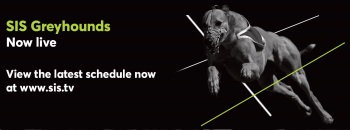The weekend saw the passing of ‘the biggest beast’ in Scottish greyhound racing history, Billy King. Not only did Billy save licensed racing north of the border for more than three decades, his contribution to British greyhound industry is almost immeasurable.
Originally owned by GRA, Shawfield was first earmarked to be an Asda in 1984 but planning permission was refused. A year later the owners announced that they would be investing in Powderhall but were now applying for planning permission to build houses on Shawfield. The McAlpine project for 200 houses was refused in May 1986 and the place was closed five months later.
Billy, who had the busiest joint in the betting ring and owned a chain of betting shops, formed a consortium to see if the place could be bought to continue racing. There were minimal takers. The owners hadn’t spent a Scottish pound note on the place in decades and they were perennially short of greyhound. Nevertheless when the place re-opened eight months later – albeit with Billy King playing a very low profile role (track bookies betting at their own tracks!!) – over 1,500 punters filed through the gates.
Billy soon became involved in greyhound politics becoming a director of both the ‘BGR’ Board and Fund. He was soon challenging authority.
The following is an example from our archives: “1998 Shawfield boss and BGRB director Billy King launches a scathing attack on BGRB Chief Executive Geoffrey Thomas following the launch of a GRA/promoter led Blue Print plan. Deemed by the press to be a ‘breakaway’ formula for the top tracks, King demands to know why the subject was not raised by Thomas, who King alleges was complicit in the scheme, at the recent BGRB board meeting.”
It was five years after that incident that Billy was joined on the BGRB by a man who would remain a very dear friend for the rest of his life, Kinsley promoter John Curran.
John recalls: “When I joined the BGRB the RCPA was basically split into three. There were the big corporates, basically GRA and BS Group. Then there were the six bookmaker owned tracks, and finally the other smaller tracks of which Billy and I were a part. The first thing I found interesting was that despite only representing one track, Billy King always received the most votes from the trade body to be on the executive and represent them on the Board.
“The reason was . . .Billy told it as it is. It wasn’t personal but he never held back. He was fearless in debate. No matter who he was dealing with, he told them straight and he wouldn’t tolerate idiots. These were the days before the greyhound industry had animal welfare as its main priority. It was all about integrity and no one had more than Billy. (Interestingly, when a number of dead greyhounds were found by the local RSPCA, it was Billy King who offered a £1,000 reward leading to a conviction.)
“The problem was, the makeup of the Board was just so unfairly weighted. An hour before every Board meeting, the tracks would meet (often with Board CEO Geoffrey Thomas present) and decide what would happen during the board meeting. It was a total carve-up by the biggest eight or nine of the 33/34 tracks who received roughly 82 per cent of the funding across the board. They ran a so called ‘merit table’ where everything, grants, prize money and marketing was dished out according to totalisator turnover. (Walthamstow received 50 times at much as Rye House!).
“GRA and its chairman Jarvis Astaire controlled the Board to all intents and purposes and were routinely supported by the Board’s CEO Geoffrey Thomas. I was young . . . at least younger . . . and was totally outraged by what I could see going on and set out to see equal division. I can’t tell you how often Billy intervened to stop me saying or doing something stupid. Even in a Board meeting he would sometimes just say, ‘John take a drink of water’ because I’ll admit I could be a real hothead. After the meeting, we would chat about what had happened and decide what to do next. He was always such wise counsel.
“There was one occasion when the BGRB organised a protest meeting as part of New Deal. The plan was to ask the bookmakers for £40m with the aim of making every greyhound race worth £200. We were going to protest at Monmore. There would be no picketing or preventing people from entering the track, but we wanted to make a point. Then the day before the protest, Walthamstow and the GRA withdrew. It felt like absolute betrayal but the smaller tracks had a discussion and decided to go ahead anyway. The like of Henlow, Harlow and ourselves.
“We had actually booked a 32 seater coach to come down from Kinsley and the night before the protest I had a visit from the local Chief Superintendent asking what we were doing. I told them there would be no trouble, it was a peaceful protest. Then I took a call from Billy. He seemed to know all about it. In fact, there was nothing that Billy didn’t know about. He might have been based in Scotland but there seemed to be nothing that Billy didn’t know or couldn’t find out.
“He didn’t tell me to call it off, but he suggested I think carefully about how we were going to proceed. The coach would have been full of ex-miners and there was a possibility that it could all have got out of hand and result in violence. Billy said: ‘Check out who is on there and throw out any nutters before you leave. Spell out to the others that they have to behave because if there is any sign of trouble the bookies won’t forget and you will never get a BAGS contract.’ I realised he was right. But for that advice, Kinsley might not still be here.
“We eventually got our fair division, thanks to Billy’s help and we worked alongside John Haynes (trainers), Bob Gilling (breeders) and Stuart Locke-Hart plus other good promoters, notably Terry Corden.”
As far as Shawfield is concerned, Billy’s critics would argue that his spending was no great improvement on GRA. Was it that he couldn’t justify the millions that it would have cost for minimal gain?
Would improved facilities have been a good investment? The hard nosed businessman didn’t think so. Looking around today, how many meetings are staged for the public with no betting shop coverage? Or was it just as likely that the idea simply didn’t appeal to him?
Billy repeatedly turned down a BAGS contract, which would have been easy to secure given his connections with the leading bookmakers. But the BAGS model didn’t suit Billy’s idea of greyhound racing.
He also famously declined SKY coverage though eventually had to relent when it became essential to obtain sponsorship for the Scottish Derby.
Curran said: “Billy struggled every year to get a sponsor for the Scottish Derby. On many occasions he sponsored it himself through other companies (famously his local Mercedes dealership) or on other occasions made up the money himself. He just loved seeing the place buzzing when the Derby was on and welcoming the Irish visitors.”
Whatever the rights and wrongs of investment, it is beyond dispute that as the Scottish independent tracks closed, Shawfield became a refuge for the remaining dog men. Originally a ‘full’ NGRC track, Shawfield introduced the smaller trainers through the permit scheme in 1989 and continued to trade prior to the intervention of Covid. As recently as last year, Billy let it be known that he intended to re-open the place.
Ask John for his favourite memories of his old friend and he admits most came about due to his skinflint Yorkshire nature.
John said: “The first class return train fare to London from Doncaster was around £240 which I was too tight to pay, even though I could have claimed it back from the Board. Quite often I couldn’t even get a seat and would end up in steerage sitting on the floor. I remember walking past first class one day and seeing a BGRB Chief Executive being served tea by a steward on his way to Leeds, though I won’t be naming him.
“The BGRB and BGRF board meetings were usually over by around 1.30 in the afternoon. Of course, I couldn’t travel peak time so would hang around in London until after 6pm. Billy used to fly down from Scotland to Gatwick. He would leave at 4.30am but his flight back wasn’t until 7pm at night and in all the years he served, I don’t remember him missing a board meeting for BGRB or BGRF. That was the level of his commitment. So anyway, during the afternoon Billy and I would always head into Central London, have a cup of tea and Billy’s favourite was a croissant with strawberry jam.
“We sat for hours and Billy was incredible company with his tales about greyhound racing. Nobody could tell a story like Billy, he was so humorous. It was plain to see, despite all his money, he loved nothing more than standing at his hod at Shawfield and enjoying the banter. He absolutely loved greyhound racing with a passion.
“I kept in regular touch with Billy, and young Billy, after he retired, and last spoke to him about three weeks ago. My thoughts are very much with his family.
“I will miss Billy King badly. He was my very dear friend; I guess in many ways we were kindred spirits.”














